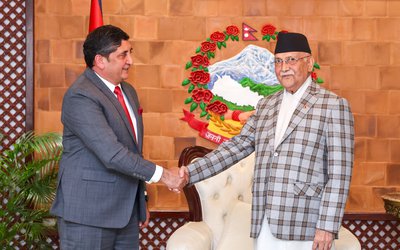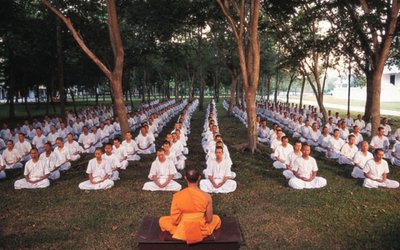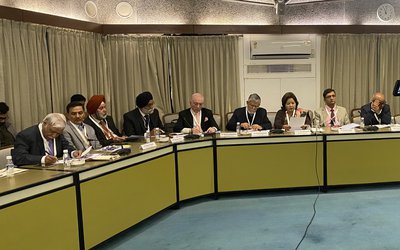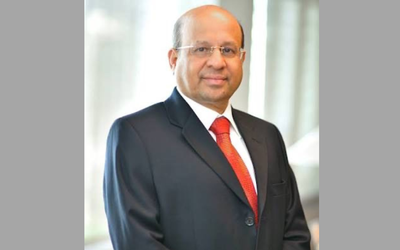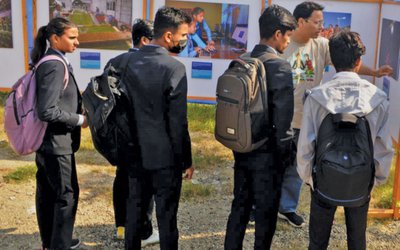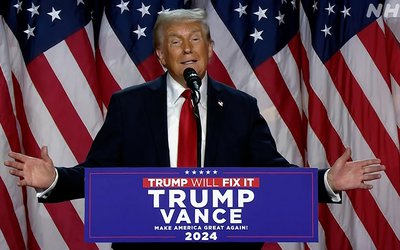Unimaginable political and social changes have taken place in Nepali society since 1950. In almost 60 years of history, people of Nepal came to the streets three times - in 1950, 1990 and 2006. No doubt, all of these struggles were led by Nepali Congress, the Grand Old Party, in the context of Nepal. It means that we cannot ignore the role of Nepali Communist Parties in shaping the democratic political framework despite their claim to establish the communist regime under the proletariat dictatorship. It has been proven that the rhetoric of dictatorship of proletariat by the Nepali Communist parties' is just a utopia uttered for public consumption.
Two diametrically different political forces are on the way of creating a just, developed and democratic state in modern Nepali history. One represents peoples' democratic aspirations and the other values the communist ideals. The mode of political contention is apparently zero sum. Thus the Nepali society is suffering from two opposite 'ism's. Nepali Congress as the only democratic force is struggling for spreading democratic norms and values for an egalitarian society. On the other hand, Communist parties claim they're the sole agents of the social underdogs. Public expectation expanded along with the formation of the governments led by the communist parties one after another in the aftermath of the Constituent Assembly elections in April 2008. But they are now disillusioned as their aspirations are belied.
There are a few disputable issues for constitution making. The contending issues are the federal structure, political system, independent judiciary, plural values of Nepali society etc. Nepali Congress has been standing for the creation of provinces with plural character, separation of powers and parliamentary democracy. But the Maoist has been stressing for single ethnic based federal structure, controlled judiciary and presidential system. From the beginning these two forces have pursued these conflicting notions. Unable to reach consensus on a few disputable issues, the jumbo 601 member rainbow Assembly was left high and dry on May 27, 2012 with drafting a constitution. The inclusive constituent assembly was dissolved by the Maoist-led government with declaration of another election in November without taking major political forces or even the election commission into confidence. Elections in democracy are a competition with consensus, which legalizes the process. But the way election was abruptly declared does not clarify whether it is for Constituent Assembly or else!
In such a situation a few analysts have accused the Nepali Congress of being against the elections. It is suspected to have feared to face the voters. The question however is: Has Nepali Congress become a conservative force which is obstructing the whole constitution making process and the bid to create a New Nepal? It is not true; it is just a blame-game. Those party men, who dared and led the nation on three difficult times in history, are not status quoists; they are the motors of change and transforming the status quo. Nepali Congress fought the anti-Rana movement in 1950, fought against the party less Panchayat regime for 30 years and again led the movement for the restoration of multiparty democracy in 1990. The party leadership is central for introducing Nepal as a federal democratic republic in the world. The Nepali Congress has played a pivotal role in abolishing monarchy and peacefully transforming the country to a secular state. Can these be understood as conservative acts?
On the other hand, some other analysts have defined the Maoist-Madhesi Morcha combine as a progressive force. In the conservative and progressive continuum, the party or parties that really internalize the aspirations of a plural society can be classified as progressive.
The present Maoist-Madhesi Morcha government, liable for the demise of the popular constituent assembly, has also utterly failed to deliver the needs such as of fertilizers to the farmers on time. The basic needs related to the livelihood of the people are yet to be met. The coalition that stands for creating single ethnic based provinces thereby undermining the rights of majority of people in the ‘designed’ province can be considered neither democratic nor progressive. Because such practices cannot be justified, they would be considered undemocratic and non-progressive as well.
Nepali society is not homogeneous. It has not only the prismatic aspirations; it has also a multicultural characteristics. It is our ground reality. None of the castes and ethnic communities living in Nepal are in a majority. So we must categorically define the conservative and progressive forces issue-wise. For example, Nepali Congress opposes the single ethnic province and the Maoist supports the single ethnic federal structure. People can judge and give their verdict and know who is conservative. The former stands for plurality and the later cannot accept the plurality. Which is democratic and progressive? People from every caste and creed can find their space in the plural character of Nepali society.
Nepali Congress is the defender of pluralism, and wants to write down the word pluralism in the constitution. On the contrary, the UCPN (Maoist) does not agree to include plural character in the constitution. Those who claim the UCPN (Maoist) is a progressive force forget its social motives and move. The observable behavior of UPCN (Maoist) is full of double standards. Its craze for power and purse is an established fact. It’s a kleptocratic group disguised as a political party and thrives on opportunistic use of the support available whether they be from their 'Peoples Liberation Army' personnel now left in the lurch or any political dispensation, the monarchy, for example, against the parliamentary democracy in the 1990s.
Presently, the UCPN (Maoist) is fuelling the ethnic tension by promoting exclusive ethnic provinces. They're talking about the communist state in which they imagine communist centrality. It is more interesting to think and see how their republican centrality fits in federalism. Federalism and Communism are two opposite characters. The first accepts the local autonomy and the self rule when the later imagines proletariat dictatorship and centrality under the flimsy concept of democratic centralism. How can we imagine that the UCPN (Maoist) creates federal states with such a centralizing political mindset? So where does their progressive character lies?
- SWISS SUPPORT: Construction Of A Trekking Trail In Koshi
- Dec 19, 2024
- PM OLI'S VISIT TO CHINA: BRI Agreement
- Dec 16, 2024
- RASUWAGADHI AND SANJEN: Begin Generation
- Dec 03, 2024
- NEPAL, INDIA ELECTRICITY TRADE Nepal's Advantage
- Dec 02, 2024
- PM Oli'S VISIT TO CHINA: Nepal's Dilemma
- Dec 01, 2024

